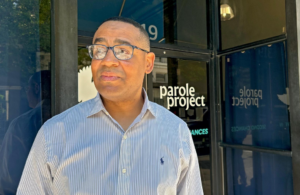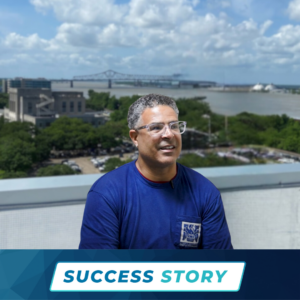Prior to August 2021, Parole Project did not have a staff social worker. But seeing the need to expand services to meet the unique needs of our clients prompted some creative thinking. Enter Meagan Snedigar – who at the time was assigned an internship with our organization through the LSU School of Social Work master’s degree program. Under the supervision of a volunteer licensed clinical social worker, she implemented assessment tools, built a directory of resources, and navigated issues clients were facing. She calls that time “simultaneously challenging and rewarding.”
“My focus was on setting up a process to screen all clients as they came into our program,” Meagan said. She developed Parole Project’s first formal assessment processes designed to identify potential issues such as mental health diagnoses, substance abuse history, and trauma responses. With new tools and a formal in-house mental health professional, Parole Project clients now had someone who could evaluate and make referrals to external service providers.
In May 2022, Meagan was officially hired as Parole Project’s staff social worker. She continued to expand the scope and refine the efficacy of her assessments, and also built working relationships with local service providers. “Over time,” Meagan said, “we have grown to address long-term ‘quality of life’ needs.”
Within 24 hours of release, each Parole Project client meets with Meagan to complete an intake screening. Based on this initial screening, she can gather important information and history that may impact a client’s long-term success. When needed, clients receive specialized follow-up screenings related to specific issues that are presented, such as cognition, substance abuse, or trauma response.
Meagan noted that there is a unique dynamic between people who have experienced long-term incarceration and mental health services. Before her internship with Parole Project, she was an intern for the mental health department at Louisiana State Penitentiary. “That experience taught me that the approach, phrasing, and collaboration are key to success.”
Some individuals may also hold a negative view about mental health services as a result of their experiences in prison. “I have to earn their trust and respect first before I can make any recommendations,” Meagan said. “To me, that means making sure that [clients] know they are seen as human beings and their input is not only heard, but valued. It also means that they have to see me as a human being, not just someone who is telling them something is wrong with them.”

To help provide a range of services to clients, Meagan works with two LSU School of Social Work graduate student interns each year. Under her supervision, they gain firsthand experience with clinical social work practices and managing individualized care plans for clients. Jun Scott and Justin Dale began their yearlong internship at Parole Project in August 2023. For them, the issues formerly incarcerated people face have been eye-opening.
Justin described working with Parole Project clients as a unique experience. “We learn a lot about the effects of trauma on mental health,” Justin said, “but it’s different seeing it in real life – not just as a case study, but an actual person sitting across from you.”
“It’s hard to hear their stories and not feel something,” Jun added. “It takes a tremendous amount of willpower and resilience to not only make it through decades in prison, but to become a better person.”
Reneé Hass, who was a social work intern from August 2022 through May 2023, is now employed as one of Parole Project’s client advocates. Combining her passion for advocacy, her social work background, and her internship experience, she is able to help identify needs before clients are released from prison. “Now we’re better equipped to meet the needs of specific individuals sooner,” Reneé said. “Even though I don’t work with them after their release, I’m still able to get them comfortable with a smooth transition of care.”
As Meagan mentioned, the evolution of tools, resources, and processes has been a constant aspect of her tenure at Parole Project. Her newest challenge is the formation of Parole Project’s Reentry Health Initiative, which is designed to meet even more needs that affect clients’ physical health, mental status, and long-term success.
“I’ve always said this is my dream job, and I’m proud to be making a difference for our clients,” she said. “I always want to do whatever I can to help them make the most of their second chance.”




